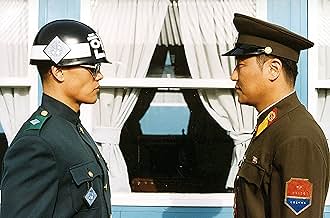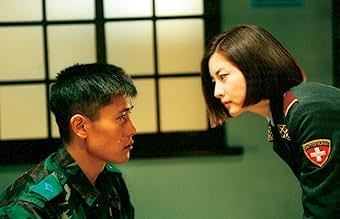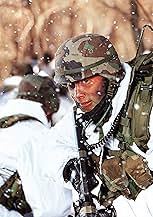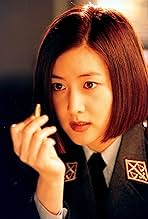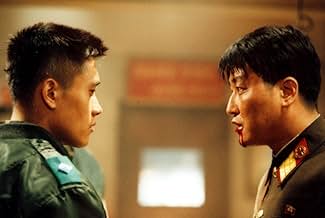IMDb-BEWERTUNG
7,7/10
36.667
IHRE BEWERTUNG
Nach einem Schusswechsel an der nord-/südkoreanischen Grenze/DMZ, bei dem 2 nordkoreanische Soldaten getötet wurden, untersucht ein neutrales schweizerisch-schwedisches Team, was tatsächlich... Alles lesenNach einem Schusswechsel an der nord-/südkoreanischen Grenze/DMZ, bei dem 2 nordkoreanische Soldaten getötet wurden, untersucht ein neutrales schweizerisch-schwedisches Team, was tatsächlich passiert ist.Nach einem Schusswechsel an der nord-/südkoreanischen Grenze/DMZ, bei dem 2 nordkoreanische Soldaten getötet wurden, untersucht ein neutrales schweizerisch-schwedisches Team, was tatsächlich passiert ist.
- Auszeichnungen
- 20 Gewinne & 16 Nominierungen insgesamt
Naeem Ghefari
- Jzzj
- (as Naeem Ghafari)
Empfohlene Bewertungen
Fusing a Hollywood-style 'who-dunnit' with an intellectually poignant essay on Korean geopolitics, 'Joint Security Area' ('JSA') offered a surprisingly moving twist to an otherwise engaging film.
It raises questions on the incredulity of ideological differences. It showcased the ridiculous, yet tragic consequences such an imposed barrier can have on its people. People, whom if not separated by mere political allegiance, have more in common than they care to admit. 'JSA' perceptively explored a modern day Korean psyche - that heartfelt desire for kinship and unity between the people of both Koreas.
'Joint Security Area' is a timely film with a universal message - "Let not differences in race, religion or ideological allegiance blindside our judgement, especially in these violent and confusing times."
I instinctively respond to this message. I hope you do as well.
It raises questions on the incredulity of ideological differences. It showcased the ridiculous, yet tragic consequences such an imposed barrier can have on its people. People, whom if not separated by mere political allegiance, have more in common than they care to admit. 'JSA' perceptively explored a modern day Korean psyche - that heartfelt desire for kinship and unity between the people of both Koreas.
'Joint Security Area' is a timely film with a universal message - "Let not differences in race, religion or ideological allegiance blindside our judgement, especially in these violent and confusing times."
I instinctively respond to this message. I hope you do as well.
The Korean peninsula is divided like no other. The two countries are still fighting in a sense the cold war, divided by loyalty to different creeds. Not an easy subject to tackle, but this film takes the subject and smooths off the edges to show us that there is hope and beauty underneath.
The film centres round an investigation over a border-side killing. Unbeknown to the investigators, intertwined into their investigation is a friendship that had developed, behind the back of their superiors, of two sets of border guards on either side of a bridge dividing the countries. The secret friendship seems to concentrate the whole Korean divide issue simply, but minor hostility still pops its head up now and again, nevertheless without needing any kind of over-dramatics the men all respect and begin to ultimately care for each ahead of all else As expected, the whole situation comes to a head, and their is some strong emotional moments but the education to anyone who watches this more than makes up for all else.
I can't think of many more emotive subjects or films that I have seen this year. The acting and direction is perfect, whilst the script is funny and emotional. Korean films are just so far ahead of all else, it just defies belief. Highly recommended, you can't go wrong with this gem of a movie.
The film centres round an investigation over a border-side killing. Unbeknown to the investigators, intertwined into their investigation is a friendship that had developed, behind the back of their superiors, of two sets of border guards on either side of a bridge dividing the countries. The secret friendship seems to concentrate the whole Korean divide issue simply, but minor hostility still pops its head up now and again, nevertheless without needing any kind of over-dramatics the men all respect and begin to ultimately care for each ahead of all else As expected, the whole situation comes to a head, and their is some strong emotional moments but the education to anyone who watches this more than makes up for all else.
I can't think of many more emotive subjects or films that I have seen this year. The acting and direction is perfect, whilst the script is funny and emotional. Korean films are just so far ahead of all else, it just defies belief. Highly recommended, you can't go wrong with this gem of a movie.
Hands across the void, separated by dogma, briefly reunited, candid, without melodrama. A gulf simply straddled, a divide quickly filled, no malice or distrust, as partnerships re-build.
Leaders seldom lead, people following the bread, on all sides there's mistrust, of what's been spoken and what's been read. Continually replayed, along friction points that burn, when constructs are embellished from pontificating churn.
If only others didn't get in the way, what a great place the world could be, every day, after day, after day.
Leaders seldom lead, people following the bread, on all sides there's mistrust, of what's been spoken and what's been read. Continually replayed, along friction points that burn, when constructs are embellished from pontificating churn.
If only others didn't get in the way, what a great place the world could be, every day, after day, after day.
After a general moratorium on film exports, JSA was amongst the first few Korean films to appear in west, to be associated with the emerging Korean 'New Wave' cinema. It was also one of the most successful and expensive films made in the country at the time, and as such was director Chan-Wook Park's breakthrough film. Park has since gone on to direct such cult items as Oldboy, in which he combines a sure sense of staging with a visual, kinetic flamboyance all of his own. A compelling and moving work in its own right, JSA makes something haunting and memorable out of a situation which, in outline, could easily have proved propagandist and dull.
It takes place entirely at the Panmunjom, the Korea DMZ peace village where North and South Koreans face off under the terms of 50-year-old treaty, glaring at each other across a thin stretch of ground, huddled over spyglasses and rifle barrels, or staring each other down across a borderline. The bitter division of the country provides a frequent background to much of its cinema just as, in its way, the spectre of past nuclear destruction has haunted that of the Japanese. But there is a difference. Japanese cinema often shows the dangerous unity of clan, kin or country in the face of crisis. In Korean cinema, brothers are often divided whilst, around them, a fractured society threatens and fights itself. Sometimes the violent resolution of the country's famous stand off promises mutually assured destruction, as is presented symbolically at the climax of Attack The Gas Station! (1999). In other films it can appear as part of an action thriller (Shiri), or as the basis of a recent war film (Taegukgi, 2004), and so on. In the more profound JSA, national division provides a starting point for an examination of the human condition, as soldiers on either side of the line discover what it is to establish warm, normal interaction - even at terrible cost.
"There are two kinds of people in this world - Commie bastards and the Commie bastards' enemies" says a South Korean officer to the Swiss investigator Major Sophie Jean (Yeong-ae Lee) at the start of Park's film. Jean works for the Neutral Nations Supervisory Commission. Previously her superior has warned her that her real job is not to investigate, "who, but why," and that "the outcome is less important than the procedure." But as Jean delves deeper into recent events with an insistence born of her own family history, revelations prove Rashmon-like, proving that the truth is by no means black and white. In fact the opening scenes, containing the harsh protocols for her work, are the least satisfying of the film. (A fact exacerbated by the poor spoken English of actress Lee and the woodenness of her Swedish companion). It is only once the viewer enters the experience of the soldiers - a process gradually revealed through a number of sometimes-gnomic flashbacks - that JSA becomes interesting.
JSA was a controversial success in Korea. The action is set very precisely, at the borderline between two societies and Park was concerned to make it as realistic as possible, spending $1 million on building his own Panmunjom. As a narrative his film is just as deliberately less exact, hovering between military thriller, patriotic tragedy, personal loyalty tale as we learn more about the soldiers, now tight-lipped under independent interrogation. Enemies, then friends, comrades and brothers, the men's deepening relationship also suggests a more taboo attraction, one which proved unsettling to home audiences. Ultimately the 'Joint Security Area' becomes less a site of military stalemate than a place where emotional ties ought to provide their own justification and balance.
The structure of Park's film is an intriguing one: a straightforward, and reasonably suspenseful investigation of an outrage frames a sequence of flashbacks and reminiscences, often presented in non-linear manner, fleshing out the main story. In between there is some newsreel footage as well as some exploration of Major Jean's motivations, while the feelings of the soldiers concerned are never elucidated, merely explored through past events. The director's achievement lies in tying all this into a reasonably convincing whole, moving the audience from the coldness of a military tribunal to the warm realm of human feeling.
There are several moments in JSA to savour, some of which occur within the no man's land between the two societies itself - a neutrality which seems to encourage a self reflection and recognition between main participants: the snowy, wordless encounter between two border patrols for instance, where tension is dissipated with a single cigarette; or the first encounter on a cold night between Sergeant Oh and Sergeant Lee, surrounded by mines, their breath freezing in an field. Elsewhere Park's camera records the absurdities of petty border etiquette, at one point shooting from overhead the dividing line where soldiers square off against one another, placing figures in some lunatic grid of their own devising. (At one point Park has two of the soldiers mock the solemnity and rigidity of the border by playing spitting games across the line.) There's a similar overhead shot later, this time looking down at a fallen soldier face up in the rain. The camera also plays a memorable part in the last scene of the film, as an ordinary snapshot is transversed by a slow pan, which pulls out of the composition a final, mute commentary of its own.
Asked earlier why one of the soldiers had deserted his post just to relieve himself, the blithe answer comes back as: "People with constipation should seize the chance when it comes." It's a philosophy that informs a good deal of JSA. Not to put too fine a point on it, the film suggests that, blocked by its own political impasse, Korea needs to loosen up and seek relief as it can. Park's film shows one way, perhaps not the best, but a memorable story all the same.
It takes place entirely at the Panmunjom, the Korea DMZ peace village where North and South Koreans face off under the terms of 50-year-old treaty, glaring at each other across a thin stretch of ground, huddled over spyglasses and rifle barrels, or staring each other down across a borderline. The bitter division of the country provides a frequent background to much of its cinema just as, in its way, the spectre of past nuclear destruction has haunted that of the Japanese. But there is a difference. Japanese cinema often shows the dangerous unity of clan, kin or country in the face of crisis. In Korean cinema, brothers are often divided whilst, around them, a fractured society threatens and fights itself. Sometimes the violent resolution of the country's famous stand off promises mutually assured destruction, as is presented symbolically at the climax of Attack The Gas Station! (1999). In other films it can appear as part of an action thriller (Shiri), or as the basis of a recent war film (Taegukgi, 2004), and so on. In the more profound JSA, national division provides a starting point for an examination of the human condition, as soldiers on either side of the line discover what it is to establish warm, normal interaction - even at terrible cost.
"There are two kinds of people in this world - Commie bastards and the Commie bastards' enemies" says a South Korean officer to the Swiss investigator Major Sophie Jean (Yeong-ae Lee) at the start of Park's film. Jean works for the Neutral Nations Supervisory Commission. Previously her superior has warned her that her real job is not to investigate, "who, but why," and that "the outcome is less important than the procedure." But as Jean delves deeper into recent events with an insistence born of her own family history, revelations prove Rashmon-like, proving that the truth is by no means black and white. In fact the opening scenes, containing the harsh protocols for her work, are the least satisfying of the film. (A fact exacerbated by the poor spoken English of actress Lee and the woodenness of her Swedish companion). It is only once the viewer enters the experience of the soldiers - a process gradually revealed through a number of sometimes-gnomic flashbacks - that JSA becomes interesting.
JSA was a controversial success in Korea. The action is set very precisely, at the borderline between two societies and Park was concerned to make it as realistic as possible, spending $1 million on building his own Panmunjom. As a narrative his film is just as deliberately less exact, hovering between military thriller, patriotic tragedy, personal loyalty tale as we learn more about the soldiers, now tight-lipped under independent interrogation. Enemies, then friends, comrades and brothers, the men's deepening relationship also suggests a more taboo attraction, one which proved unsettling to home audiences. Ultimately the 'Joint Security Area' becomes less a site of military stalemate than a place where emotional ties ought to provide their own justification and balance.
The structure of Park's film is an intriguing one: a straightforward, and reasonably suspenseful investigation of an outrage frames a sequence of flashbacks and reminiscences, often presented in non-linear manner, fleshing out the main story. In between there is some newsreel footage as well as some exploration of Major Jean's motivations, while the feelings of the soldiers concerned are never elucidated, merely explored through past events. The director's achievement lies in tying all this into a reasonably convincing whole, moving the audience from the coldness of a military tribunal to the warm realm of human feeling.
There are several moments in JSA to savour, some of which occur within the no man's land between the two societies itself - a neutrality which seems to encourage a self reflection and recognition between main participants: the snowy, wordless encounter between two border patrols for instance, where tension is dissipated with a single cigarette; or the first encounter on a cold night between Sergeant Oh and Sergeant Lee, surrounded by mines, their breath freezing in an field. Elsewhere Park's camera records the absurdities of petty border etiquette, at one point shooting from overhead the dividing line where soldiers square off against one another, placing figures in some lunatic grid of their own devising. (At one point Park has two of the soldiers mock the solemnity and rigidity of the border by playing spitting games across the line.) There's a similar overhead shot later, this time looking down at a fallen soldier face up in the rain. The camera also plays a memorable part in the last scene of the film, as an ordinary snapshot is transversed by a slow pan, which pulls out of the composition a final, mute commentary of its own.
Asked earlier why one of the soldiers had deserted his post just to relieve himself, the blithe answer comes back as: "People with constipation should seize the chance when it comes." It's a philosophy that informs a good deal of JSA. Not to put too fine a point on it, the film suggests that, blocked by its own political impasse, Korea needs to loosen up and seek relief as it can. Park's film shows one way, perhaps not the best, but a memorable story all the same.
10Jamester
It's been a few years, but I saw this in a Singapore theatre a day or two after it opened there. A Korean friend had mentioned it was good, so I went to check it out assuming it would be good. OH MY GOSH! This was an excellent movie and it seems so unfortunate that it didn't get a wide-release in North American (or not that I know of) as I think it would have done really well! This was #1 in Korea beating out Spider Man!! In fact, the North Korean leader even requested a copy for his viewing pleasure -- perhaps to get his own look at what South Korea might be plotting, or maybe simply to be entertained with some great film-making.
The movie combines a very likable Hollywood touch with compelling plot action, in contrast to some very personal moments and an amazing sense of suspense in this movie. I was floored.
The whole location of where the movie takes place -- in the demilitarized zone between North and South Korea -- and the acute tension was certainly captured and sure made for great story-telling. I can't remember another movie where I saw and experienced more tension in a story than in this movie! It fit the story perfectly, and really got the movie off to a great start. Then, as the characters were introduced, piece by piece, we explored action, emotion, and thought. The movie examined, re-examined and really brought us close not only to the events, but to the people in the story. I felt a range of emotions in this story culminating in a really great movie!
This is a must-see!
The movie combines a very likable Hollywood touch with compelling plot action, in contrast to some very personal moments and an amazing sense of suspense in this movie. I was floored.
The whole location of where the movie takes place -- in the demilitarized zone between North and South Korea -- and the acute tension was certainly captured and sure made for great story-telling. I can't remember another movie where I saw and experienced more tension in a story than in this movie! It fit the story perfectly, and really got the movie off to a great start. Then, as the characters were introduced, piece by piece, we explored action, emotion, and thought. The movie examined, re-examined and really brought us close not only to the events, but to the people in the story. I felt a range of emotions in this story culminating in a really great movie!
This is a must-see!
Wusstest du schon
- WissenswertesSince filming at the real JSA is impossible, an exact replica was built at the studio, which still stands.
- PatzerThe moment before Sgt. Lee shoots Sgt. Oh in the shoulder you can clearly see the squib device underneath his uniform.
- Zitate
Sgt. Oh Kyeong-pil: Your shadow is over the line. Watch it!
- VerbindungenReferenced in Weakest link: Hitori gachi no hôsoku: Folge vom 29. Juli 2002 (2002)
- SoundtracksThe Rush Light
Russian folk song
Performed by the Moscow Chamber Orchestra, conducted by Konstantin Orbelyan (as Constantine Orbelian), with Corey Cerovsek (violin)
Top-Auswahl
Melde dich zum Bewerten an und greife auf die Watchlist für personalisierte Empfehlungen zu.
- How long is Joint Security Area?Powered by Alexa
Details
- Erscheinungsdatum
- Herkunftsland
- Offizieller Standort
- Sprachen
- Auch bekannt als
- Joint Security Area
- Drehorte
- Produktionsfirmen
- Weitere beteiligte Unternehmen bei IMDbPro anzeigen
Box Office
- Weltweiter Bruttoertrag
- 124.861 $
Zu dieser Seite beitragen
Bearbeitung vorschlagen oder fehlenden Inhalt hinzufügen

Oberste Lücke
What is the Japanese language plot outline for JSA - Joint Security Area (2000)?
Antwort

